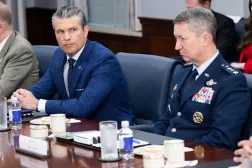Nominee for Pentagon CAPE director says office’s workforce is strained, needs new tech

The Trump administration’s nominee for director of the Pentagon’s Cost Assessment and Program Evaluation office told lawmakers that the organization’s workforce is “strained” and needs to be equipped with new technologies.
Michael Payne, a former Air Force officer, has recently been serving as the acting director of CAPE and previously worked there in other top positions as a member of the Senior Executive Service. In July, he was nominated to lead CAPE on a permanent basis.
That office is tasked with supporting the secretary of defense and other DOD leadership “through non-advocate, fact-based decision support on the size, shape, affordability, disposition, and readiness of the future joint force to achieve the National Defense Strategy,” according to a Pentagon description of the role. That includes providing independent cost estimates and reviews of programs and portfolios, and upskilling the department’s analytical workforce.
CAPE has approximately 150 employees, including civilian workers and military personnel, according to the Pentagon.
In his written responses to lawmakers’ questions ahead of his confirmation hearing Thursday with the Senate Armed Services Committee, Payne noted that the workforce is currently “stretched” and “strained” as they perform their duties.
“CAPE’s cost assessment workforce, while stretched, can meet existing statutory requirements by strategically delegating work to the Services when appropriate. The recent addition of statutory requirements for military construction and sustainment review cost estimating has necessitated increased delegation to the Services. For CAPE and the Department, I believe the workforce is sufficient, though strained in certain areas as it adapts to broader national workforce demographic and skill shifts. If confirmed, I am committed to ensuring that the Department uses new technologies and approaches to maximize the efficiency of our cost estimating workforce and to providing transparent assessments as the Department’s cost community needs evolve,” Payne wrote.
The CAPE office’s IT systems and tools are antiquated, he told lawmakers. If confirmed, he vowed to kick-start an effort to modernize the organization’s data collection and analysis tools to boost productivity.
“The Department’s data collection and analysis faces technical, policy, structural, and cultural barriers. Examples include limitations of legacy IT systems, collection of data from across multiple organizations’ IT systems, complications due to classification and need-to-know requirements, and cultural resistance to change. If confirmed, I would work closely with the other stakeholders to prioritize data reform efforts, leverage CAPE’s role in providing enterprise data for the analytic and cost communities to identify effective data initiatives,” Payne wrote.
Areas ripe for data improvements include budget transparency, personnel management, strategic analysis, force management, and acquisition management, according to Payne.
He told senators that one of his top priorities, if confirmed, would be to modernize CAPE processes and systems.
“We must leverage cutting-edge methods, tools, and digital systems to deliver faster, more accurate, and more relevant evaluations to keep pace with modern warfare and acquisition demands,” he said at his confirmation hearing Thursday.
Emerging AI capabilities could provide a helping hand in boosting the effectiveness and efficiency of CAPE’s analytic work and other DOD efforts, but there are challenges to adopting those.
“The Department has accumulated significant technical debt, which inhibits our ability to fully embrace the power of the digital environment. This is especially prohibitive as the Department seeks to harness the power of AI. CAPE’s IT environment is no exception,” he wrote in his responses to advance policy questions.
If confirmed, he promised to work with the DOD chief information officer and the military services to estimate costs for remediating that technical debt and enabling digital transformation. He also told senators that he would team with the undersecretary of defense for research and engineering to plan for and provide cost estimates for the Pentagon’s AI programs.
Additionally, CAPE will need to adjust as the Pentagon moves to expand the industrial base to include more nontraditional contractors and commercial entities and encourage investors to support innovative companies that work with the department.
“As new financing mechanisms shape the defense industrial base, CAPE must adapt models to reflect how private capital affects cost structures, production scalability, and long-term affordability. If confirmed, I will ensure CAPE’s cost estimates capture how private investment influences industry cost behavior – particularly in areas like dual-use technology development, supply chain resilience, and manufacturing capacity. To do this, CAPE will need to strengthen engagement with the broader defense industrial and financial communities,” Payne wrote.






